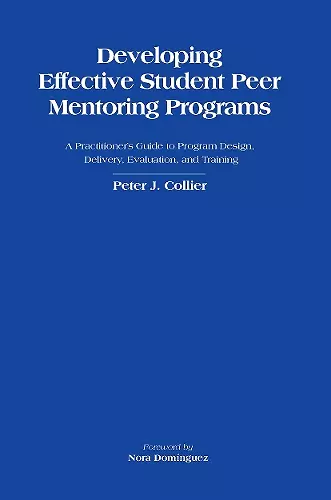Developing Effective Student Peer Mentoring Programs
A Practitioner's Guide to Program Design, Delivery, Evaluation, and Training
Format:Hardback
Publisher:Taylor & Francis Inc
Published:17th Oct '15
Currently unavailable, and unfortunately no date known when it will be back
This hardback is available in another edition too:
- Paperback£32.99(9781620360767)

At a time when college completion is a major issue, and there is particular concern about the retention of underserved student populations, peer mentoring programs offer one solution to promoting student success. This is a comprehensive resource for creating, refining and sustaining effective student peer mentoring programs. While providing a blueprint for successfully designing programs for a wide range of audiences – from freshmen to doctoral students – it also offers specific guidance on developing programs targeting three large groups of under-served students: first-generation students, international students and student veterans.This guidebook is divided into two main sections. The opening section begins by reviewing the issue of degree non-completion, as well as college adjustment challenges that all students and those in each of the targeted groups face. Subsequent chapters in section one explore models of traditional and non-traditional student transition, persistence and belonging, address what peer mentoring can realistically achieve, and present a rubric for categorizing college student peer-mentoring programs. The final chapter in section one provides a detailed framework for assessing students’ adjustment issues to determine which ones peer mentoring programs can appropriately address. Section two of the guidebook shifts from the theoretical to the practical by covering the nuts and bolts of developing a college student peer-mentoring program. The initial chapter in section two covers a range of design issues including establishing a program timeline, developing a budget, securing funding, getting commitments from stakeholders, hiring staff, recruiting mentors and mentees, and developing policies and procedures. Subsequent chapters analyze the strengths and limitations of different program delivery options, from paired and group face-to-face mentoring to their e-mentoring equivalents; offer guidance on the creation of program content and resources for mentors and mentees, and provide mentor training exercises and curricular guidelines. Section two concludes by outlining processes for evaluating programs, including setting goals, collecting appropriate data, and methods of analysis; and by offering advice on sustaining and institutionalizing programs. Each chapter opens with a case study illustrating its principal points. This book is primarily intended as a resource for student affairs professionals and program coordinators who are developing new peer-mentoring programs or considering refining existing ones. It may also serve as a text in courses designed to train future peer mentors and leaders.
"I would highly recommend Peter Collier's book, Developing Effective Student Peer Mentoring Programs. It clearly walks an educator through the theory, methods, training, psychology and best practices to successfully guide future peer mentors and cross-cultural leaders."
Christie Ennis
Campus ToolKit
“As the President of the International Mentoring Association and Director of the Mentoring Institute at the University of New Mexico, I have immersed myself in the study of developmental relationships, and have seen their positive effects through my work. I consider this mentoring handbook as a vital tool for any institution that is looking to establish a peer-mentoring program, and recommend its use to those who have already implemented programs in their search to improve on their model, and thus the program’s overall effectiveness. I believe that by explicitly defining and demonstrating all of the multifaceted aspects involved in creating a mentoring program, and by addressing the best strategies to approach this subject, Developing Effective Student Peer Mentoring Programs is a must read for anyone interested in implementing a peer mentoring program on their college campus.”
Nora Domínguez, Director, Mentoring Institute
University of New Mexico
Developing Effective Student Peer Mentoring Programs is a superb book that should be read by all higher education professionals who are looking for practical strategies grounded in solid research to start a peer mentoring program. Peter Collier’s book is an accessible comprehensive guide that provides specific approaches for serving veterans, international and underrepresented students.
Buffy Smith
University of St. Thomas, Minneapolis
“Collier’s treatment of peer mentorship is THE resource you want on this topic. It is grounded in theory and scholarship but also provides practical advice and institutional examples of peer mentor programs. It is comprehensive in its coverage of the history and purpose of these programs and also addresses the important elements of successful program delivery such as recruitment, training, and evaluation. Further, it is inclusive of peer mentoring for 'new-traditional' student populations such as international, service members and veteran, and first-generation undergraduates."
Jennifer R. Keup, Director
National Resource Center for The First-Year Experience and Students in Transition
ISBN: 9781620360750
Dimensions: unknown
Weight: 684g
400 pages